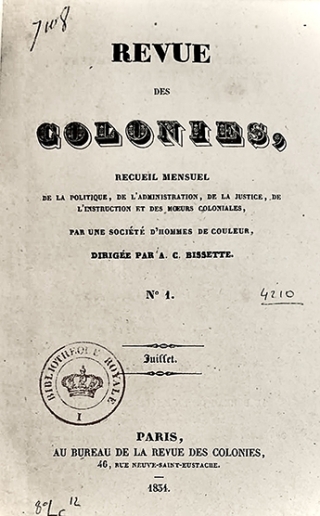French Professor Receives Two Fellowships to Support Research on 19th-Century Abolitionist Journal
July 06, 2022

Maria Beliaeva Solomon will be scholar-in-residence at the Schomburg Center for Research in Black Culture and a fellow of the American Council of Learned Societies.
By ARHU Staff
Maria Beliaeva Solomon, assistant professor of French in the School of Languages, Literatures, and Cultures, has been awarded two fellowships to support her research on the Revue des Colonies, a French abolitionist journal published between 1834 and 1842.
Beginning in the fall, Beliaeva Solomon will be a scholar-in-residence at the New York Public Library’s Schomburg Center for Research in Black Culture, the “preeminent repository for materials related to the history and cultures of peoples of African descent.” She will have access to the research collections and resources of the Schomburg, with assistance of its curatorial and reference staff. Through 2023, she will continue to conduct research at the Schomburg Center and other New York area libraries as a fellow of the American Council of Learned Societies (ACLS), which supports “outstanding scholarship in the humanities and interpretive social sciences.”
The award will support Beliaeva Solomon’s efforts—with the help of graduate students in the French program and faculty at the Maryland Institute for Technology in the Humanities (MITH)—to create an open-access digital scholarly edition of the Revue, including the full text of its print run, with annotations, and, eventually, English translations.
“I’m so honored that this project was selected for an ACLS fellowship and for the Schomburg Scholars-in-Residence Program,” said Beliaeva Solomon, a scholar of 19th-century French and Francophone literature and media focusing on questions of circulation and translation. “This will give me the time necessary to research and properly contextualize this invaluable archive.”
Printed in Paris by a self-identified “society of men of color,” the Revue was the first French periodical for and by people of color, reporting on politics, economics and society in the French colonies and beyond. It also circulated and promoted the advancement of Black literature globally. In 1837, the Revue published the first known work of fiction by an identified African American author (in French), New Orleanian Victor Séjour's “Le Mulâtre” ("The Mulatto"). Throughout its print run, the Revue also featured French translations of major Black American and British authors such as Phillis Wheatley, Olaudah Equiano and Ottobah Cugoano.
The Schomburg Center is one of only a few libraries in the world to hold a large quantity of original prints of the Revue. Currently, only a select set of issues are publicly available through the online collections of the French National Library, with more preserved in microform at various libraries across Europe and North America. Beliaeva Solomon said her project will build on the research of a number of scholars who have done essential work on the Revue despite the difficulty of access.
She will begin her work this summer with two graduate students, thanks to a Faculty-Student Research Award from the UMD Graduate School. The team will work with Research Programmer Raffaele Viglianti of MITH to develop a website to host the digital edition, which Beliaeva Solomon hopes will become a widely used resource for interdisciplinary work.
“As we seek to make marginalized perspectives, voices and texts part of our cultural record, the Revue is an incredibly valuable contribution,” Beliaeva Solomon said. “The goal is to give people access to a resource that is invisibilized.”
Beliaeva Solomon added that she is grateful to the College of Arts and Humanities for its “support and consistent commitment to faculty research in the humanities.”
Image credits: Headshot courtesy of Beliaeva Solomon. Page 1 of Issue 1 of the Revue des Colonies courtesy of the Bibliothèque Nationale de France.


